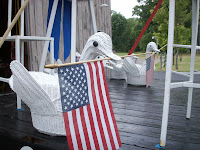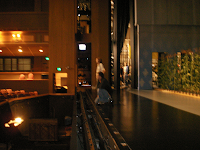Wednesday, July 6, 2011
Wednesday, July 11, 2007
 |
 |
In this early stage of rehearsing, the creative team divides its time between music and blocking. With any form of theater, the way an actor delivers his or her lines is essential to building dramatic tension. Conductor Antony Walker coaches the singers not just on tuning or rhythm, but on expression. "In the end I want to conduct it as little as possible and have you drive it."
Directing is very much about taking a page with some music or words on it and creating a world out of it. No two directors will create this world in the same way. Alden's dynamic staging is a far cry from what could be staged as a rather stiff court drama. Instead, there is movement going on nearly every moment. Each line of music has a clear intention behind it and Alden ensures that the singers express it in the staging.
 |
Wednesday, July 4, 2007
 While the Glimmerglass staff is dedicated to producing high-quality operas, it's not "all work and no play"! Every year, the company enjoys throwing its own events as well as participating in community ones.
While the Glimmerglass staff is dedicated to producing high-quality operas, it's not "all work and no play"! Every year, the company enjoys throwing its own events as well as participating in community ones.
One of these events is the Springfield Center 4th of July Parade. Interns like Brooke Cartus and Kate Foster are excited to hand out candy and operate the float.

Set Designer John Conklin and Technical Director Abby Rodd (above left) design the float every year. This year's float featured a larger-than-life waving Uncle Sam, metal chairs, bird baskets holding flags, and a full-size phone booth with a real ringer (to "let freedom ring").



Tuesday, July 3, 2007
 |
Glimmerglass productions get seven onstage tech rehearsals prior to dress rehearsals with piano and orchestra. Often, this means they hit the stage while still finalizing choreography and staging, and before all costumes and set elements are completed. This schedule gives the creative team a chance to see all of the elements together, which means if things need to change, there are still two weeks to fix them. This week it's Offenbach and Gluck on stage.
 Gluck chorus member and Music Intern Dan Richards was surprised that adding technical elements made such a large difference in the way the show was performed. "Before we went to tech rehearsal, we ran the show at the rehearsal venue and it really felt like it was ready to be performed, but then we got into the space and we had to make the performance fit into that space," he said. "The artistic team tried some new ideas. Adding the set, lighting, and costume made everything come together, to feel more like a whole."
Gluck chorus member and Music Intern Dan Richards was surprised that adding technical elements made such a large difference in the way the show was performed. "Before we went to tech rehearsal, we ran the show at the rehearsal venue and it really felt like it was ready to be performed, but then we got into the space and we had to make the performance fit into that space," he said. "The artistic team tried some new ideas. Adding the set, lighting, and costume made everything come together, to feel more like a whole."  Both shows open the first weekend in July, so rehearsal time is crucial for everyone, both on-stage and off, to perfect their parts. The cast, stage and lighting crew, and creative team are in rehearsals six hours a day. Meanwhile, the other crews are still working away on props, costumes, and set pieces.
Both shows open the first weekend in July, so rehearsal time is crucial for everyone, both on-stage and off, to perfect their parts. The cast, stage and lighting crew, and creative team are in rehearsals six hours a day. Meanwhile, the other crews are still working away on props, costumes, and set pieces.  During tech rehearsals, many costumes are finished. However, there are some not quite finished and some that need to change. "It's all about being flexible--it's just adding and changing every time. Sometimes we have to make adjustments on stage, so the designers can see what it looks like," Shelby Newport, Assistant Wardrobe Supervisor, said.
During tech rehearsals, many costumes are finished. However, there are some not quite finished and some that need to change. "It's all about being flexible--it's just adding and changing every time. Sometimes we have to make adjustments on stage, so the designers can see what it looks like," Shelby Newport, Assistant Wardrobe Supervisor, said.One thing is for certain--everyone's busy preparing what looks to be an exciting season!
Wrapping
 |
At this point, Glass had already begun to establish his germinal style which, he later acknowledged, owed much to Milhaud. Several early works were published but the composer has disavowed those written before 1965. He became increasingly dissatisfied with his music and, indeed, with the musical milieu of the time. Acknowledging his colleagues’ dedication to serialism, he nevertheless considered serial compositions to be music of the past masquerading as music of the present. In 1964 Glass moved to Europe, where he eventually settled in Paris to study harmony and counterpoint with Boulanger. From Boulanger he acquired a technical mastery of basic compositional skills that he felt he previously lacked. During his second year with Boulanger, Glass was engaged to transcribe a film score by the sitar player Ravi Shankar into Western notation for Parisian studio musicians.
Monday, July 2, 2007
Subscribe to:
Comments (Atom)

